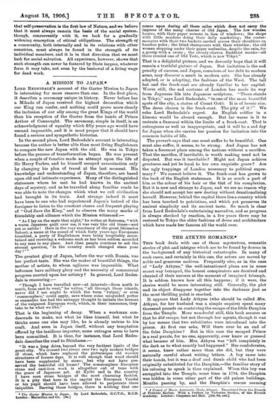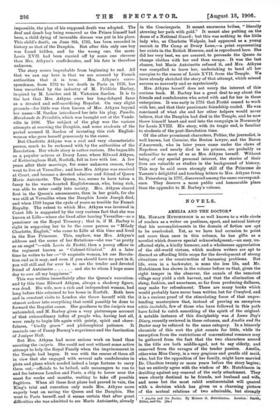THE ATKYNS ROMANCE.*
Tnis book deals with one of those mysterious, romantic stories of plot and intrigue which are to be found by dozens in the background of any historical catastrophe. In many of such cases, and certainly in this one, the actors are moved by noble and generous motives. Frequently also, as in the case of " Lady Atkyns," the well-intentioned plans are in some secret way betrayed, the honest conspirators are deceived and cheated of their success at the moment of imagined triumph. It is seldom known how all this happens ; if it were, the stories would be more interesting still. Generally, the plot and its object disappear together into the darkness just as the most thrilling point is reached.
It appears that Lady Atkyns (who should be called Mrs. Atkyns, for her husband was a simple esquire) spent many thousand pounds on contriving the escape of the little Dauphin from the Temple. More wonderful still, this book assures us that he did escape, but not through her agents, though it was by her means that two substitutes were introduced into the prison. At first one asks, Will there ever be an end of the false Dauphins ? But in this case the escaped Prince is a real puzzle, for no one, apparently, ever knew or guessed what became of him. Mrs. Atkyns was "left completely in the dark as to what exactly had happened." Her confederates, it seems, knew rather more than she did, but they were naturally careful about writing letters. A boy came into their hands, but it was a deaf and dumb child who had been originally substituted for the Dauphin,—the familiar story of his refusing to speak is thus explained. When this boy was smuggled into the Temple, some time in 1794, the Dauphin was hidden in some other part of the old palace buildings. Months passing by, and the Dauphin's rescue seeming • A Friend of Marie Antoinette (Lady Atkens). Translated from the French of Frederic Barbey. With a Preface by Victorien Sardou, of the French Academy. London s Chapman and Hall. [10a ed. net.]
impossible, the plan of his supposed death was adopted. The deaf and dumb boy being removed as the Prince himself had been, a child dying of incurable disease was put in his place.
This child's death, on June 8th, 1795, has been recorded in history as that of the Dauphin. But after this only one boy was found bidden, and he the wrong one, the mute. Louis XVII. had been carried off by some one cleverer than Mrs. Atkyns's confederates, and his fate is therefore unknown.
The story seems improbable from beginning to end. All that we can say here is that we are assured by French authorities that it is true. Mrs. Atkyns's corre- spondence, from 1792 to her death in Paris in 1836, has been unearthed by the industry of M. Frederic Barbey, inspired by M. LenOtre and M. Victorien Sardou. It is to the last that Mrs. Atkyns owes her long-delayed fame as a devoted and self-sacrificing Royalist. On very slight grounds—for little was then known of Mrs. Atkyns beyond
her name—M. Sardou introduced her into his play, Pamela, Marchande de Frivolites, which was brought out at the Vaude- ville in 1896. The subject of the play was the various
attempts at rescuing the Dauphin, and some students of the period accused M. Sardou of inventing this rich English- woman who gave herself generously to the cause.
But Charlotte Atkyns was a real and very characteristic person, much to be reckoned with by the authorities of the Revolution. Her whole story is rather curious. She began life as a popular actress at Drury Lane, where Edward Atkyns, of Ketteringham Hall, Norfolk, fell in love with her. A few years after their marriage, for some unknown reason, they went to live at Versailles ; and here Mrs. Atkyns was received at Court, and became a devoted admirer and friend of Queen Marie Antoinette. The Queen, too, seems to have taken a fancy to the warm-hearted Englishwoman, who, being rich,
was able to enter easily into society. Mrs. Atkyns shared first in the Queen's amusements, then in her griefs, for she was still at Versailles when the Dauphin Louis Joseph died, and when 1789 began the cycle of years so terrible for French Royalty. The extent to which Mrs. Atkyns was involved in Court life is suggested by the very curious fact that she was known at Lille—where she 'lived after leaving Versailles—as a pensioner on the Royal Treasury ; that is, if M. Barbey is right in supposing her to be the same person as " Milady Charlotte, English," who came to Lille at this time and lived in the Rue Princesse. This, anyhow, was Mrs. Atkyns's address and the scene of her flirtations—she was "as pretty as an angel" —with Louis de Frotte, then a young officer in the regiment known as " Colonel-General." At a later time he writes to her :—" 0 exquisite woman, let our Revolu- tion end as it may, and even if you should have no part in it, you will still and for ever be to me the tender and devoted
friend of Antoinette and she to whom I hope some day to owe all my happiness."
This was written immediately after the Queen's execution, and by this time Edward Atkyns, always a shadowy figure, was dead. His wife, now a rich and independent woman, had long before this returned to ber home in Norfolk. Both here and in constant visits to London she threw herself with the utmost ardour into everything that could possibly be done to forward the Royalist cause. Her goodness to the emigres was unbounded, and M. Barbey gives a very picturesque account of that extraordinary influx of people who, having lost all, were ready to begin life again with gaiety, spirit and cheer- fulness, "kindly grace" and philosophical patience. It reminds one of Fanny Burney's experience and the fascination of Juniper Hall.
But Mrs. Atkyns had more serious work on hand than assisting the emigres. She could not rest without some active attempt to help the Royal Family when the imprisonment in the Temple bad begun. It was with the rescue of them all in view that she engaged with several safe confederates in plots and plans which needed indeed a large fortune to early them out,—officials to be bribed, safe messengers to rim to and fro between London and Paris, a ship to hover near the coast for weeks and months, waiting to take off possible fugitives. When all these first plans had proved in vain, the Sing's trial and execution only made Mrs. Atkyns more eagerly bent on saving the Queen and the Dauphin. She went to Paris herself, and it seems certain that after great, difficulties she was admitted to see Marie Antoinette, already in the Conciergerie. It meant enormous bribes, " literally strewing her path with gold." It meant also putting on the dress of a National Guard ; but this was nothing to the little lady. who, as Charlotte Walpole, had appeared as a young recruit in The Camp at Drury Lane,—a :print representing her exists in the British Museum, and is reproduced here. She did her very best, we are assured, to persuade . the Queen to change clothes with her and thus escape. It was the last chance, but Marie Antoinette refused it, and Mrs. Atkyns was compelled to leave her, . undertaking to bend all- her energies to the rescue of Louie XVII. from the Temple. We have already sketched the story of that attempt, which missed success so narrowly and so mysteriously.
Mrs. Atkyns herself does not usurp the interest of this curious book. M. Barbey has a great deal to say about the friends and confederates who acted with and for her in these enterprises. It was early in 1795 that Frotte ceased to work with her, and that their passionate friendship cooled. He was convinced of what she and her other helpers would never believe, that the Dauphin had died in the Temple, and he now threw himself heart and soul into the campaign in Normandy for Louis XVIII. His story, with its tragic end, is familiar to students of the post-Revolution time.
Of the other prominent characters, Peltier, the journalist, is well known, but Cormier, the Breton lawyer, and the Baron d'Auerweck, who in later years came under the claws of Napoleon and nearly died in his prisons, are probably as unfamiliar to most of us as Mrs. Atkyns herself. Without being of any special personal interest, the stories of their lives are valuable as studies in the background of history. This may be said more strongly still of the Princesse de Tarente's delightful and touching letters to Mrs. Atkyns from St. Petersburg in 1797, discovered among the same correspond- ence. They deserve a more public and honourable place than the appendix to M. Barbey's volume.



































 Previous page
Previous page